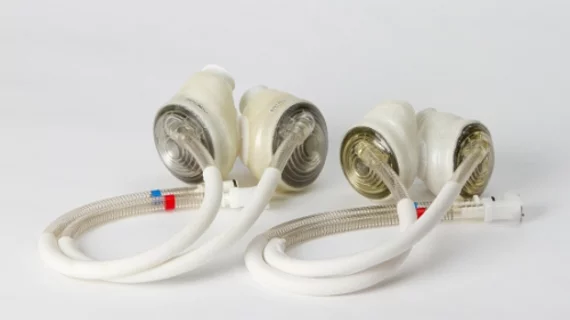FDA: Temporary artificial heart linked to excess mortality, stroke risk
The FDA on Aug. 17 sent a letter warning cardiologists about high mortality and stroke rates associated with the Temporary Total Artificial Heart (TAH-t) Companion 2 Driver System during a post-approval study.
According to the FDA, the final results indicate higher rates of those outcomes compared with the first-generation driver manufactured by SynCardia Systems—the Circulatory Support System (CSS) Console.
Specifically, 60 percent of patients survived six months post-implant with the C2 Driver System, compared to 74.2 percent of patients who received the CSS Console. Mortality rates were also higher at three months with the newer device (34.5 percent versus 22.5 percent).
In addition, stroke rates associated with the second-generation driver were more than triple those of the CSS Console at three months (26.5 percent versus 7.9 percent).
“We recommend that you carefully consider these mortality and stroke results from the TAH-t post-approval study when making treatment decisions, and discuss the risks and benefits of the C2 Driver System with patients,” stated the letter, which was signed by William Maisel, MD, MPH, chief medical officer of the FDA’s Center for Devices and Radiological Health.
SynCardia Systems first received FDA approval for its temporary artificial heart in 2004, with the CSS Console as its initial pneumatic driver system. The TAH-t serves as a bridge to transplant in patients with heart failure and severe bi-ventricular failure, replacing a patient’s ventricles and valves to take over blood-pumping duties.
The smaller C2 Driver System—which activates the TAH-t—gained FDA clearance in 2012 under the condition that SynCardia conduct a study assessing its postmarket performance.
According to the letter, the agency previously posted updates about a higher mortality rate with the C2 driver, particularly among patients who required pre-implant circulatory rescue interventions.
Now that the final data are out, the FDA recommends clinicians consider the results of the study when making treatment decisions and encourages them to report adverse events with the SynCardia TAH-t through the MedWatch voluntary reporting program. Also, devices suspected to be associated with adverse events should be returned to the manufacturer for analysis.

